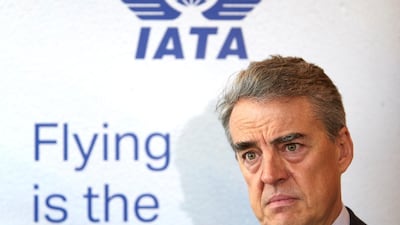The head of the International Air Transport Association called for government support for airlines, warning of economic consequences and many companies collapsing, as new travel restrictions exacerbate their woes.
Extending lines of credit, reducing infrastructure costs, deferring tax payments and slashing airport fees, are measures governments need to explore, said Alexandre de Juniac, director general of Iata, following a US entry ban on foreign passengers from Europe's 26-member Schengen countries.
“Airlines will need emergency measures to get through this crisis. Governments should be looking at all possible means to assist the industry through these extreme circumstances,” said Mr de Juniac of the global aviation lobby group. “Without a lifeline from governments we will have a sectoral financial crisis piled on top of the public health emergency.”
President Donald Trump on Friday imposed a 30-day ban on foreign nationals who have been in European countries in the past two weeks from entering the US.
Also, stricter flight restrictions worldwide to prevent the spread of the coronavirus to more countries, have hammered the aviation industry deeper into crisis as travel demand shrinks and bookings plunge.
Even before Mr Trump’s ban on the lucrative Transatlantic routes, Iata forecast that airlines will lose $113 billion (Dh415bn) in passenger revenue worldwide this year because of the Covid-19.
The US ban will add more financial strain on airlines, that were already reeling from suspended flights that prompted operators to give staff paid or unpaid leave and ground part of their fleet.
The total value of the US-Schengen market in 2019 was $20.6bn, with restrictions on European travel expected to impact Germany, France and Italy the most, Iata said.
"This will create enormous cash-flow pressures for airlines," Mr de Juniac said, noting this latest blow could push some airlines to go under.
In 2019, there was a total of around 200,000 flights scheduled between the US and Schengen countries, or around 550 flights per day, ferrying a total of about 46 million passengers.
The US is the biggest air travel market in the world, though China is catching up quickly.
About 11 per cent of the world's international flights will be hit by the US travel ban over the next four weeks, according to OAG. That means it will affect passengers arriving on nearly 7,000 flights in that duration and, if those flights were cancelled due to a lack of demand, it would remove two million seats each way from the market. The restriction excludes US residents and their immediate families.
Delta Air Lines and United Airlines will be the most affected by the ban. Together they were scheduled to fly 31 per cent of all flights between the US and the Schengen area in this period, OAG data showed. Lufthansa is the most affected European airline, operating 13 per cent of flights between the two areas.
Delta said it would cancel seven routes between US and Europe including Amsterdam, London, Paris and Dublin.
Stocks of US and European airlines were battered on Friday.
The World Travel & Tourism Council said last week, the ban will have a "damaging impact on the US economy yet won't stop the spread of the coronavirus Covid-19".
"Rather than an outright ban, the priority should be on public health within the country and mitigating the potential harm to individuals, that will be impacted by this ban," said Gloria Guevara, president and chief executive of WTTC.
“The virus is already a pandemic and is spreading within communities domestically. The best approach is to conduct thorough testing and put in place isolation measures,” she said.
Among measures to aid airlines during the unprecedented crisis, the European Commissions said it will temporarily suspend a requirement that airlines use their airport slots for at least 80 per cent of the time or risk losing them – a rule that had forced some operators to fly near-empty planes.
The rule suspension will last until June, which could have otherwise cost an airline as much as $27 million.
“Airlines are struggling to match capacity to the fast-changing situation. The commission’s decision to suspend slot use rules until June means that airlines can make these critical decisions immediately – without worrying about the impact on future availability of slots. This is much needed and most welcome,” said Rafael Schvartzman, Iata regional vice president for Europe. “However, given all the uncertainties, it is disappointing that the decision does not cover the full season.”


